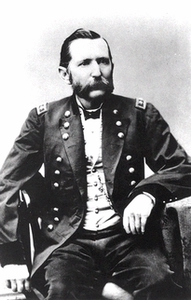CONNOR, PATRICK EDWARD

Patrick E. Connor
Patrick Edward Connor was a soldier, building contractor, mining entrepreneur, and political leader. He was born in Ireland in 1820 and left Killarney for New York City at the age of twelve. Patrick E. O'Connor (his name then) enlisted in the U.S. Army at the age of eighteen. After serving a five-year term in Iowa Territory as a private in the First Dragoons, Connor returned to New York City to enter the mercantile business for a short time before moving to the new state of Texas, probably in 1846. With the outbreak of the Mexican War, he volunteered for duty in a company of Texas volunteers, who elected him as their captain. He was wounded at the Battle of Buena Vista where he distinguished himself for this courage and military skill.
Following the war, he traveled to California early in 1850 to engage in various projects, including attempting to found a settlement at the mouth of the Trinity River. In May of 1853 he joined a group of twenty "California Rangers" who were commissioned to hunt down and kill the famous bandit, Joaquin Murieta. After this success, he settled down in Stockton, California, where he entered the road-building and construction business. He married a woman with the same last name, Johanna Connor of Redwood City, on 14 August 1854 and was soon recognized as one of the leading citizens of Stockton.
When the Civil War started, Connor volunteered for service in the Union army and was appointed Colonel of the Third California Infantry with instructions to guard and secure the overland mail route across the West. In October 1862 he moved his command to Salt Lake City, where he founded Camp Douglas and at once engaged in an acrimonious and bitter cold war with Brigham Young and the Mormon people, whom he accused of being disloyal and immoral. Connor won a brigadier general's star for his destruction of 250 northwestern Shoshoni at Bear River near Franklin, Idaho, on 29 January 1863. In the spring of 1865, he was named commander of the District of the Plains and placed in charge of the Powder River Expedition, whose goal was to pursue and punish the Sioux, Arapaho, and Cheyenne Indians in what is today Wyoming. The expedition was unsuccessful except for a band of Arapaho Connor defeated at Tongue River on 29 August 1865. Connor then returned to the military District of Utah where he was discharged as a Brevet Major-General in the spring of 1866.
From this time until his death in 1891 he devoted himself to the development of mining property in Utah and Nevada. Successful at first, he eventually lost his most valuable mines and died relatively poor. He was also involved in politics and ran unsuccessfully for major offices in Nevada while also combating Mormon economic and political control in Utah. He lived long enough to see the Saints renounce their practice of polygamy (which he abhorred) and to watch the non-Mormon population succeed in gaining political offices. Connor is remembered as the founder of the Gentile "Liberal Party" in Utah and as the "Father of Utah Mining."
Disclaimer: Information on this site was converted from a hard cover book published by University of Utah Press in 1994. Any errors should be directed towards the University of Utah Press.